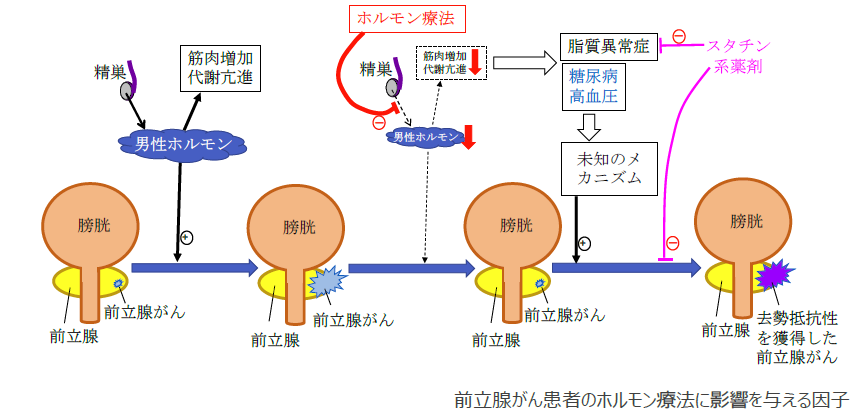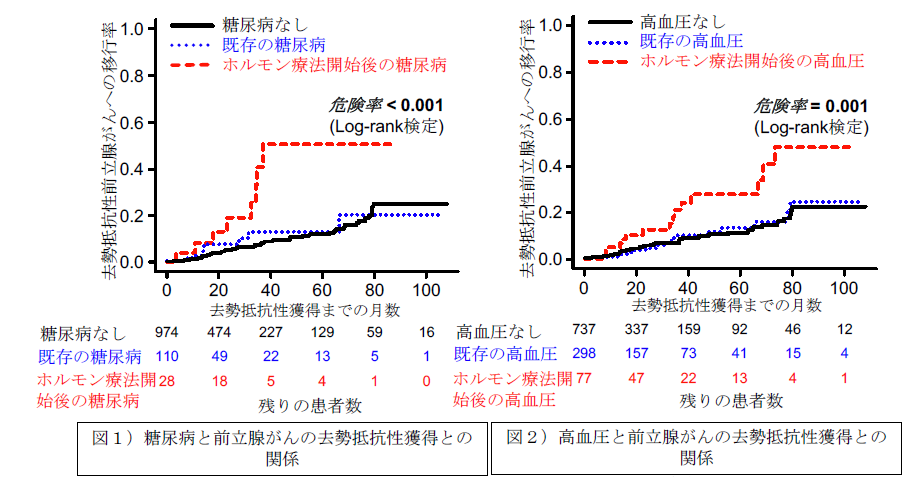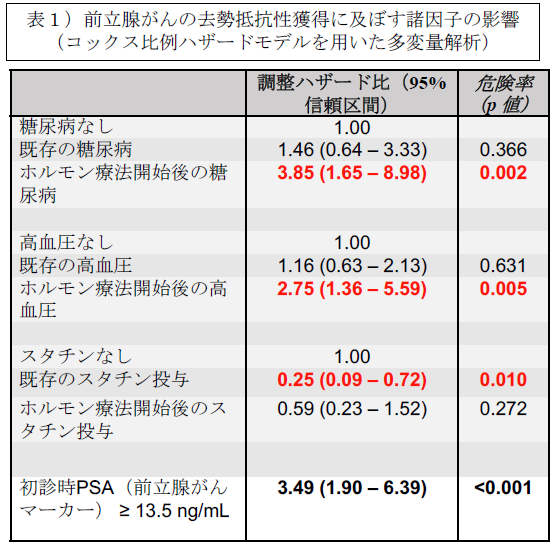Achievements
Successful identification of factors that influence prognosis of prostate cancer; potential application to prolonging anti-cancer effects of hormone therapy
Professor Atsushi Kawabata, Department of Department of Pharmacy Faculty of Department of Pharmacology Kinki School of Pharmacy (Higashiosaka, Osaka Prefecture); Tomonori Hayashi, Pharmacy Department, Kinki University Nara Hospital (Ikoma, Nara Prefecture); Atsushi Hirata, School of Pharmacy Department, Kinki University Hyogo Medical University (Ikoma, Nara Prefecture); Tomoka Miyamoto, Assistant Professor, Faculty of Pharmacy, Hyogo School of Pharmacy (Nishinomiya, Hyogo Prefecture) (also a researcher in the Faculty of Pharmacy, Kinki University); Shiori Iwane, School of Pharmacy Department, Kansai Medical University Hospital (Hirakata, Osaka Prefecture) (also a researcher in the Faculty of Pharmacy, Kinki University; affiliation to Kansai Medical University Hospital at the time of writing), Kazuki Utani, Pharmacy Department, Kansai Medical University; Hidefumi Kinoshita, Professor, Head of the Department of Urological Surgery, Kansai Medical University; Yuichi Koizumi, Pharmacy Department, Social Medical Corporation Seichokai Fuchu Hospital (Izumi, Osaka Prefecture); Masanori Fujitani's research group extracted medical data from patients who were diagnosed with prostate cancer at Kinki University Nara Hospital, Kansai Medical University Hospital, and Seichokai Fuchu Hospital and did not have distant metastasis*1, and who had received highly effective hormone therapy, and analyzed factors that affect the effectiveness of hormone therapy. As a result, they found that in patients who developed diabetes or hypertension after starting hormone therapy, hormone therapy became ineffective and prostate cancer was more likely to recur, and that in patients who had been taking medication for dyslipidemia before the onset of prostate cancer, the effectiveness of hormone therapy continued for a long time, making prostate cancer less likely to recur. The results of this research are expected to provide clues for early prediction of recurrence in prostate cancer patients receiving hormone therapy, and to contribute to the creation of new strategies to prolong the effects of hormone therapy.
A paper on this matter was published online in the interdisciplinary international academic journal Scientific Reports on Friday, October 4, 2024.

Topic
Opposing impact of hypertension/diabetes following hormone therapy initiation and preexisting statins on castration resistant progression of nonmetastatic prostate cancer: a multicenter study
(Conflicting effects of hypertension/diabetes mellitus developed after the initiation of hormone therapy and existing statin regimens on castration resistance in non-metastatic prostate cancer: a multicenter study)
Author of the paper
Tomonori Hayashi1, Tomoka Miyamoto2,6, Shiori Iwane3,6, Masanori Fujiya4, Kazunori Uchitani3, Yuichi Koizumi4, Atsushi Hirata1, Hidefumi Kinoshita5, Atsushi Kawabata6,* *Corresponding author
Affiliations: 1 Department of Pharmacy, Kinki University Nara Hospital, 2 School School of Pharmacy, Hyogo College of Medicine, 3 Department of Pharmacy, Kansai Medical University Hospital, 4 Department of Pharmacy, Seicho-kai Fuchu Hospital, 5 Department of Nephrology and School of Pharmacy, Kansai Medical University Hospital, 6 Laboratory of Pathopharmacology, School Department of Pharmacology Kinki University
Research Summary
● If prostate cancer patients develop diabetes or hypertension after starting hormone therapy, the effectiveness of hormone therapy will be weakened and the prognosis will be poor.
In patients who had been taking medication to treat dyslipidemia (high LDL cholesterol) before the onset of prostate cancer, the effects of hormone therapy were sustained for the long term and recurrence was less likely.
● The results of this research are expected to provide clues for predicting cancer recurrence in prostate cancer patients undergoing hormone therapy and to be useful in sustaining the effects of hormone therapy.
Research Background
Prostate cancer, one of the most common cancers in Japanese men, can be detected early by using tumor markers. Prostate cancer grows dependent on male hormones, so male hormone deprivation therapy is extremely effective for early prostate cancer. However, the effectiveness of hormone therapy gradually decreases with continued treatment, and within five years, 10-20% of patients become resistant to hormone therapy, resulting in recurrence of prostate cancer and poor prognosis. In addition, it is known that prostate cancer patients who undergo long-term hormone therapy develop metabolic syndrome accompanied by muscle mass loss as a side effect, and may develop complications such as diabetes, hypertension, and dyslipidemia.
Previous research at the Department of School of Pharmacy Pharmacology, Faculty Department of Pharmacology, Kinki University, has revealed that the activity of some factors in prostate cancer cells cultured in the absence of male hormones is strongly influenced by the concentration of sugar outside the cells. However, it was not clear what effect diabetes actually had on the prognosis of prostate cancer patients.
Research Methods and Results
The research group analyzed the medical data of patients who had been diagnosed with prostate cancer over the past eight years at Kinki University Nara Hospital, Kansai Medical University Hospital, and Seicho-kai Fuchu Hospital and had undergone hormone therapy and had no distant metastasis. As a result, they found that prostate cancer patients who developed diabetes or hypertension after starting hormone therapy subsequently became ineffective against hormone therapy (cancer cells acquired resistance to castration), making prostate cancer more likely to recur. On the other hand, there was no relationship between the development of dyslipidemia after starting hormone therapy and the acquisition of castration resistance in cancer cells, but in patients who had been taking drugs to treat dyslipidemia (high LDL cholesterol) before the onset of prostate cancer, the anti-cancer effect of hormone therapy was sustained for a long time, making cancer recurrence less likely. The results of this study suggest that diabetes and hypertension that develop after starting hormone therapy in prostate cancer patients lead to a poor prognosis, and that the effectiveness of hormone therapy can be maintained over the long term if it is used in combination with drugs used to treat dyslipidemia.
detail
In a study of prostate cancer patients without distant metastasis, factors influencing the time it takes for prostate cancer cells to acquire castration resistance after hormone therapy were analyzed. It was found that patients who developed diabetes (Figure 1) or hypertension (Figure 2) after starting hormone therapy were more likely to have prostate cancer cells acquire castration resistance. In addition, multivariate analysis*2 revealed that patients who developed diabetes after starting hormone therapy had a 3.85-fold higher risk of acquiring castration resistance than the reference group, and patients who developed hypertension had a 2.75-fold higher risk (Table 1). On the other hand, patients who developed dyslipidemia after starting hormone therapy did not promote the acquisition of castration resistance in prostate cancer cells. Therefore, we focused on previous research that showed that statin drugs*3, which are used to treat hyper LDL cholesterol, among other dyslipidemia drugs, have anti-cancer effects, and conducted further analysis. We found that in patients who had been taking statin drugs before the onset of prostate cancer, the risk of acquiring castration resistance was 0.25 times that of the reference group, revealing that administration of statins suppresses the acquisition of castration resistance in prostate cancer cells (Table 1).
The results of this study indicate that, among the metabolic syndrome factors that develop as side effects of hormone therapy in prostate cancer patients, diabetes and hypertension are factors that worsen prognosis, whereas dyslipidemia does not appear to be a factor. On the other hand, it was revealed that in patients who have been taking statins, which are used to treat high LDL cholesterol, since before the onset of prostate cancer, the anticancer effect of hormone therapy is maintained for a long time, contributing to improved prognosis. Based on the results of this study, it is expected that the effectiveness of hormone therapy can be maintained for a long time by combining hormone therapy with statins in the future.


Publication
Scientific Reports (impact factor 3.8 in 2023)